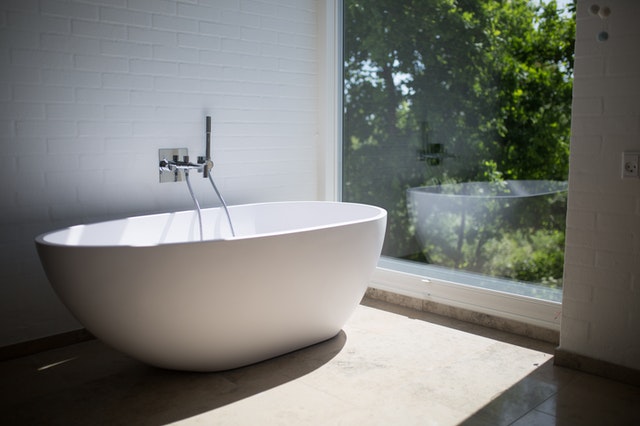What’s your bathing preference?
Baths are calming and relaxing, but showers are quick and refreshing. Still, you may be wondering—is one better than the other? Is it possible to miss out on potential benefits, or worse, put yourself at risk with your bathing preferences?
Here’s what a germ expert and an internal medicine doctor want you to know about a bath vs. shower.
Bath vs. shower: Which is better for cleanliness?
Both showers and baths provide some advantages and disadvantages, says New York-based internist Niket Sonpal, MD.
So it’s up to your priorities to decide whether to take one or the other.
“Showers are usually better for cleansing your body and getting rid of bacteria and dirt,” he says. “At the same time, baths are great for stimulating the nervous system, exfoliating the skin, and relaxing the muscles.”
Echoing Dr. Sonpal, germ expert Philip Tierno, PhD, a microbiologist at NYU Grossman School of Medicine, says that both showers and baths are similar in terms of cleanliness.
“As far as getting you clean, both will get you clean,” he says.
The advantages of taking a bath
One of the benefits of taking a bath is that it allows people to add beneficial ingredients to the water.
“For example, you can add Epsom salt to ease pains and aches, or honey to decrease redness or irritation from eczema, sunburns, or irritated skin,” Dr. Sonpal says.
Frequent baths may also lessen stress and fatigue because resting in a bathtub can calm your nerves and lighten your mood after a stressful day, Dr. Sonpal adds.
In fact, one small 2018 cross-sectional study on 38 people published in the journal Evidence-Based Complementary and Alternative Medicine compared baths vs. showers.
Researchers found that people who took immersion baths in warm water daily had less fatigue, stress, and depression than those who took showers. Plus, they also found that baths increase blood flow and encourage the metabolism to process waste.
Baths can also lessen the pain of hemorrhoids, help regulate your core body temperature, and exfoliate old layers of skin, according to Dr. Sonpal.
Tierno does recommend rinsing after a bath in a shower, if possible, to wash off any lotions or soaps that may have accumulated. And unless you have a cut or contusion, baths are perfectly fine because of the protective skin barrier, which protects you from anything you may pick up.
The advantages of taking a shower
Showers expose the body to less water, and the more water your body is exposed to, the more likely essential oils will be stripped from your skin, Dr. Sonpal explains.
“A hot shower can also relieve migraines and headaches, wash away toxins, and improve circulation,” he says. “Showers can improve circulation because the running water causes blood to rush to the skin’s surface.”
Showers also allow water to efficiently mix with soap on your body to break apart sweat, dirt, and oil on your skin, Dr. Sonpal adds. Even cold showers have some potential benefits, too.
One 2016 study in PLoS One looking at 3,018 people found that a hot-to-cold shower routine resulted in people taking fewer sick days over a year.
Cleaning your shower and bathtub is key
“There is often an aspect of the bath that is slightly dirtier than the shower, and that is on the surface of the bathtub itself,” Tierno says.
Tierno is referring to the bacterial biofilm, a collection of microorganisms that stick to each other and surfaces to create a film-like substance. It develops on any surface that interacts with water.
Everyone has bacteria inside and outside their body—and that’s not necessarily a bad thing. But bacteria on surfaces such as a bathtub create a biofilm where not-so-nice organisms can thrive and give rise to infection.
Although many people may rinse off the bathtub after a soak, you can only get rid of the biofilm on the tub itself if you use a strong bristle brush to remove it.
However, the same is also true for the bottom of the shower. It may have biofilm and fungus that could lead to athlete’s foot or other infections, especially if you have a cut on your feet or are immunosuppressed, according to Tierno.
“Generally speaking, that’s something you would watch in the shower,” Tierno says. “Just as you should wash the biofilm [from the bath] you should do the bristle brush on the floor of the shower with soap and water as part of your household hygiene.”
Should people take a bath vs. shower?
“I think if someone is interested in thoroughly cleansing themselves, a shower may be the better option,” Dr. Sonpal says. “However, if someone wants to treat chronic pain, ease fatigue, or simply relax, a bath may be the way to go.”
Both baths and showers serve a purpose and provide certain health benefits, so Dr. Sonpal recommends listening to your body each day to find out what option is best.
And although Tierno prefers showers, as long as you’re cleaning your bathtub and shower correctly, either work to get the dirty job of cleaning done.
The post Should You Take a Shower or a Bath? What Experts Think appeared first on The Healthy.







